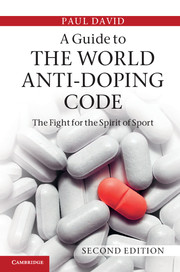Book contents
- Frontmatter
- Contents
- List of Figures
- Preface to the Second Edition
- Table of Cases
- Introduction
- 1 The development of principles relating to anti-doping regimes: the role of the Court of Arbitration for Sport
- 2 Overview of the Code and the World Anti-Doping Program
- 3 The International Standards in more detail
- 4 The nature of the Code and its interpretation and application
- 5 Articles 1 and 2 of the Code: anti-doping rule violations under the Code
- 6 Article 3 of the Code: the proof of anti-doping rule violations under the Code
- 7 Responsibility for testing and investigations, results management and hearings
- 8 Articles 9 and 10 of the Code: sanctions for anti-doping rule violations
- 9 Article 13: appeals under the Code
- 10 Appeals to the Swiss Supreme Court from CAS, challenges to the Code in the courts and claims outside the Code
- 11 The way ahead: review of the 2009 Code
- Index
- References
11 - The way ahead: review of the 2009 Code
Published online by Cambridge University Press: 05 February 2013
- Frontmatter
- Contents
- List of Figures
- Preface to the Second Edition
- Table of Cases
- Introduction
- 1 The development of principles relating to anti-doping regimes: the role of the Court of Arbitration for Sport
- 2 Overview of the Code and the World Anti-Doping Program
- 3 The International Standards in more detail
- 4 The nature of the Code and its interpretation and application
- 5 Articles 1 and 2 of the Code: anti-doping rule violations under the Code
- 6 Article 3 of the Code: the proof of anti-doping rule violations under the Code
- 7 Responsibility for testing and investigations, results management and hearings
- 8 Articles 9 and 10 of the Code: sanctions for anti-doping rule violations
- 9 Article 13: appeals under the Code
- 10 Appeals to the Swiss Supreme Court from CAS, challenges to the Code in the courts and claims outside the Code
- 11 The way ahead: review of the 2009 Code
- Index
- References
Summary
Amending the Code
WADA is responsible for overseeing the evolution and improvement of the Code and for initiating amendments to the Code under Article 23.6. Where WADA puts forward amendments, it must institute a consultation process under which athletes, Signatories and governments provide their comments on the proposed amendments. After the required consultation process has taken place, the proposed amendments must be approved by a two-thirds majority of the WADA Foundation Board, with a majority of the public sector and Olympic movement members casting votes, in order to be adopted. Amendments come into effect three months after approval, and Signatories to the Code must implement applicable amendments within one year of approval by the WADA Foundation Board.
WADA initiated amendments to the 2003 Code in 2005, and a consultation process took place over the next eighteen months, which culminated in the meeting of the WADA Foundation Board in Madrid in November 2007 at the World Conference on Doping. At this meeting, amendments to the Code were approved and the deadline for acceptance of the amended Code by Signatories was 1 January 2009. Also on 1 January 2009 the International Standard for Testing 2009 was implemented. The revised standard introduced the detailed requirements for the implementation and administration of the whereabouts regime.
- Type
- Chapter
- Information
- A Guide to the World Anti-Doping CodeA Fight for the Spirit of Sport, pp. 376 - 385Publisher: Cambridge University PressPrint publication year: 2013

